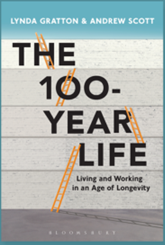How will living to 100 change our working lives – a reflection on the book ‘The 100-year life’
My approach to career coaching has been inspired by the book ‘The 100-year Life’, written by Lynda Gratton and Andrew Scott. In this blog, I provide a summary of the main points of the book, and explain where career coaching comes in.
The majority of children born in rich countries today can expect to live to more than 100. This increase in life expectancy has been happening for decades and yet we continue to structure our lives the way our parents or even grandparents did.
But without societal and structural change, a longer life could end up being a curse rather than a gift.
The conclusion? We can’t afford to retire at the age our parents did – we will have to work for longer. But, in doing so, our mental and physical health and fitness, as well as our enthusiasm for life, could suffer.
The other (more positive!) conclusion is that the current ‘three-stage model’ of life – education → career → retirement must be replaced by a multi-stage life with the potential for much greater individualised sequencing. Transitions will become the norm. As new ground is being broken here, there will be no experienced individuals or models to guide us – this will have to be invented as we go along – and one of many reasons why an informed and versatile career coach might be needed!
With this in mind., my intervention is designed to help:
- those in their 20s who have a long stretch of life ahead to shape their lives differently
- those in their 40s/50s/60s who need to reconsider their futures and invest in their second half(s) of life
More specifically it’s about:
- Honing down on your options – find out more about your identity, values and life priorities vis-a-vis your commitments and build them into a short and long-term career/life plan
- How to plan to include several career breaks to ‘explore’ – new countries, cultures, ways of working; trial and error to learn more about ourselves (and how you might monetise ideas)
- How to budget for periods in and out of work, transitions, retraining, pensions and other external financial commitments. Consideration of (building) tangible assets. (particularly if you’re young, how to manage the debt/asset challenge)
- How to involve partners and families in the plan (so that they can do the same!) This is particularly pertinent around taking breaks for having and rearing children.
- How to make a moving plan (that recognises external factors and ongoing learning will reshape your priorities, ideas and approach)
- Planning to consider ‘intangibles’ – this covers ‘assets’ such as friends, family and fitness, skills and knowledge and happiness! (Remember assets can ‘depreciate’). These intangibles include:
- Productive assets: assets that help an individual become productive and successful at work (and should therefore boost income). Training and reskilling. Strength of peer group and reputation. Turning recreation into re-creation
- Vitality assets: Mental and physical health and well-being; stress management and balanced living; regenerative friendships. How to focus on nutrition, fitness and health so you have the energy vitality and ability to approach a multi-stage career over many decades.
- Transformational assets: self-knowledge (understanding values/intelligence – emotional and normal), ability to reach out to new networks – multicultural, multi-generational and explore/ create new experiences and experimentation. Seeking out and learning from ‘crucible’ experiences. A lot of its’s about developing the right mentality .How to be an independent producer and create a portfolio (This ‘asset class is relatively new and much less considered than the other assets, but vitality important).
The multi-stage/100-year life will need to balance out the investment in the above. There needs to be a balance and trade-off between all these ‘assets’. The coach can help the client plan this out.
The multi-stage process is age-agnostic – ‘juvenescence’ is the way forward.
In the end this is about turning a challenging future in to one that provides you with agency. Remember that government and business has not caught up with this yet; that is why you need the guidance of a coach!







Leave a reply